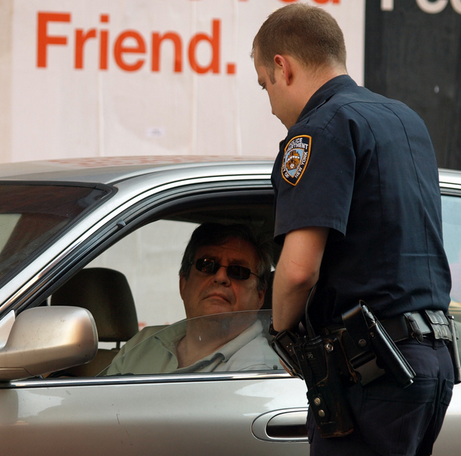For at least two weeks, the number of summonses issued and arrests made by police officers across the city has dropped precipitously. For victimless offenses like drinking alcohol in public, the decline in ticketing may serve as an interesting natural experiment in whether "broken windows" policing is really effective. But for motor vehicle violations like speeding and failure-to-yield, the drop in enforcement is putting people's lives at risk.

While neither the mayor nor the police unions will yet call the drop in enforcement a work slowdown, the stats are clear. And it turns out that moving violations against dangerous drivers are falling more than other types of enforcement activity. The past couple weeks have shown -- if it wasn't already apparent -- how little priority most rank-and-file officers give to street safety.
Traffic tickets are down 92 percent compared to a year ago, with some precincts failing to issue a single moving violation last week. In contrast, arrests over the same period declined by 56 percent.
It's too early to know for sure what effect the slowdown is having on vehicular violence, but the signal the police are sending is clear: They really don't care if you drive dangerously, so go ahead and do it.
This attitude isn't just surfacing the last two weeks. NYPD's police academy does not include traffic enforcement as part of its curriculum, and most officers seem uninterested in street safety. When an MTA bus driver was arrested last month for failure to yield after he killed an elderly pedestrian while turning through an East Flatbush crosswalk, the Post reported that officers told the bus driver “this is ridiculous, but we have orders and we have to follow them."
The Right of Way Law, which officers grumbled about enforcing, is one of the most important Vision Zero laws passed last year. Despite a promise to train all of the department's patrol officers to arrest drivers who violate the law, enforcement remains spotty, even in cases where all known evidence points to driver culpability.
Some NYPD brass recognize the disconnect. “My goal is to change the mindset of the individual officers who are on daily patrol in the precincts. They are the ones who are going to make a difference on [Vision Zero],” Chief of Transportation Thomas Chan told the City Council last February. “I cannot rely on a speciality unit to do this, to achieve this goal.”
One wrinkle in the work slowdown: Parking tickets are most often issued by Traffic Enforcement Agents, not patrol officers. Although they are a unit of the NYPD, TEAs are unarmed and represented by CWA Local 1182, the same union that represents sanitation workers, not by the unions for patrol officers, detectives, or captains. Nevertheless, TEAs are slowing down their work, too: The number of parking tickets last week dropped 93 percent compared to the year before.
As for speeding and failure to yield enforcement, despite some improvement in the past year, it's obvious that traffic safety is no big deal to the department's rank and file. For the last two weeks, it’s been just another bargaining chip in the feud with the mayor.





